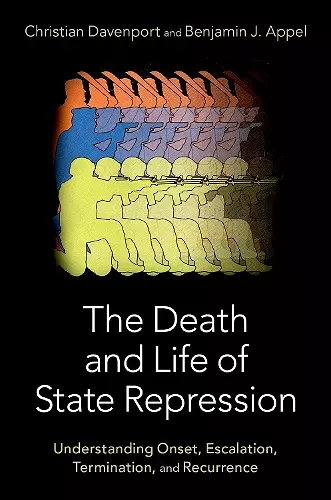The Death and Life of State Repression
Understanding Onset, Escalation, Termination, and Recurrence
Christian Davenport author Benjamin Appel author
Format:Paperback
Publisher:Oxford University Press Inc
Published:16th Dec '22
Currently unavailable, and unfortunately no date known when it will be back
This paperback is available in another edition too:
- Hardback£88.00was £88.00(9780197655375)

The Death and Life of State Repression addresses a problem that dates back at least 75 years, if not before. Since World War II, individuals and institutions from around the world have been concerned with state repression/human rights violations and since about 1990, a robust empirical literature has emerged to investigate what drives this behavior up or down (i.e., exploring variation). While useful, this work has generally ignored important aspects of the "Death/Life cycle" of state repression: i.e., its onset, escalation, termination and recurrence. Such an approach is important because different explanations and policies might be relevant for different parts of the cycle. Exploring a new database of repressive spells from 1976-2006 and new theory regarding spells, The Death and Life of State Repression breaks new ground in a variety of different ways. The book argues that repression is a sticky process that is largely slow-moving and non-adaptive. Consequently, change in this behavior is rare unless the ruling cohort is perturbed in some manner. What perturbs is somewhat surprising. The authors do not argue or find support for the predominant variables/policies advanced by the international community (i.e., naming/shaming, international law, military intervention and economic sanctions). Rather, their research advances and finds that political democratization plays a crucial role in reducing and stopping most aspects of repressive spells, and democratization itself is influenced by non-violent direct action. The book has major implications for those who wish to study state repression, as well as those who have an interest in trying to reduce and stop it from occurring across the Death/Life cycle. The path to less repressive behavior has never been clearer.
This book is a comprehensive, ambitious, and sober analysis of the life cycles of large-scale spells of state repression. Most importantly, Davenport and Appell find that domestic politics—not international politics—are the most crucial in curtailing the onset, escalation, and persistence of state repression. For all its imperfections, democracy tends to prevent a state from initiating mass violence, and nonviolent civil resistance tends to prevent such repression from escalating. This book upends much of what we thought we knew about state repression--and what can be done to stop it. A must-read. * Erica Chenoweth, Harvard University *
Christian Davenport is the world's leading scholar of state repression and has made a great team with Benjamin Appel. The Death and Life of State Repression is an instant classic. It analyzes the correlates of entire spells of repression - how they start, how they end, and, importantly, how they escalate. Using new data, rigorous methods, deep case knowledge, and unparalleled creativity, Davenport and Appel show that there is no one-way, linear relationship between democratization and different forms of human rights violations. While democratization processes can reduce state repression, they can in turn be shaped by the legacies of repressive practices and by the interventions that try to end them. Their book has implications for the broader literature on democratization and will be the standard against which all subsequent contributions in the repression literature are measured. * Nicholas Sambanis, University of Pennsylvania *
The Death and Life of State Repression provides academics with an insightful and perceptive analysis that should fundamentally reconceptualize the study of large-scale human rights abuses, while offering governments and activists new insights into how to reverse such atrocities. A tour de force by Christian Davenport, one of the world's deepest thinkers on political violence, and Benjamin Appel. * Dr. Rachel Kleinfeld, Senior Fellow, Democracy, Conflict and Governance, Carnegie Endowment for International Peace *
This book represents a tour de force that is a must-read for all interested in stopping state repression—from scholars, to policymakers, activists, and the general public. The authors offer a new ontology of repression to study its onset, escalation, duration, and recurrence. They then meticulously examine the influence of a full range of domestic and international factors that have been proposed to curtail repression. Their sobering findings reveal that not much has helped, but there is hope, and we can do better. Indeed, the book offers a path forward to understand exactly how we can better protect people from the most vicious forms of state repression. * James Raymond Vreeland, Professor of Politics and International Affairs, Princeton University *
ISBN: 9780197654927
Dimensions: 153mm x 237mm x 14mm
Weight: 345g
232 pages